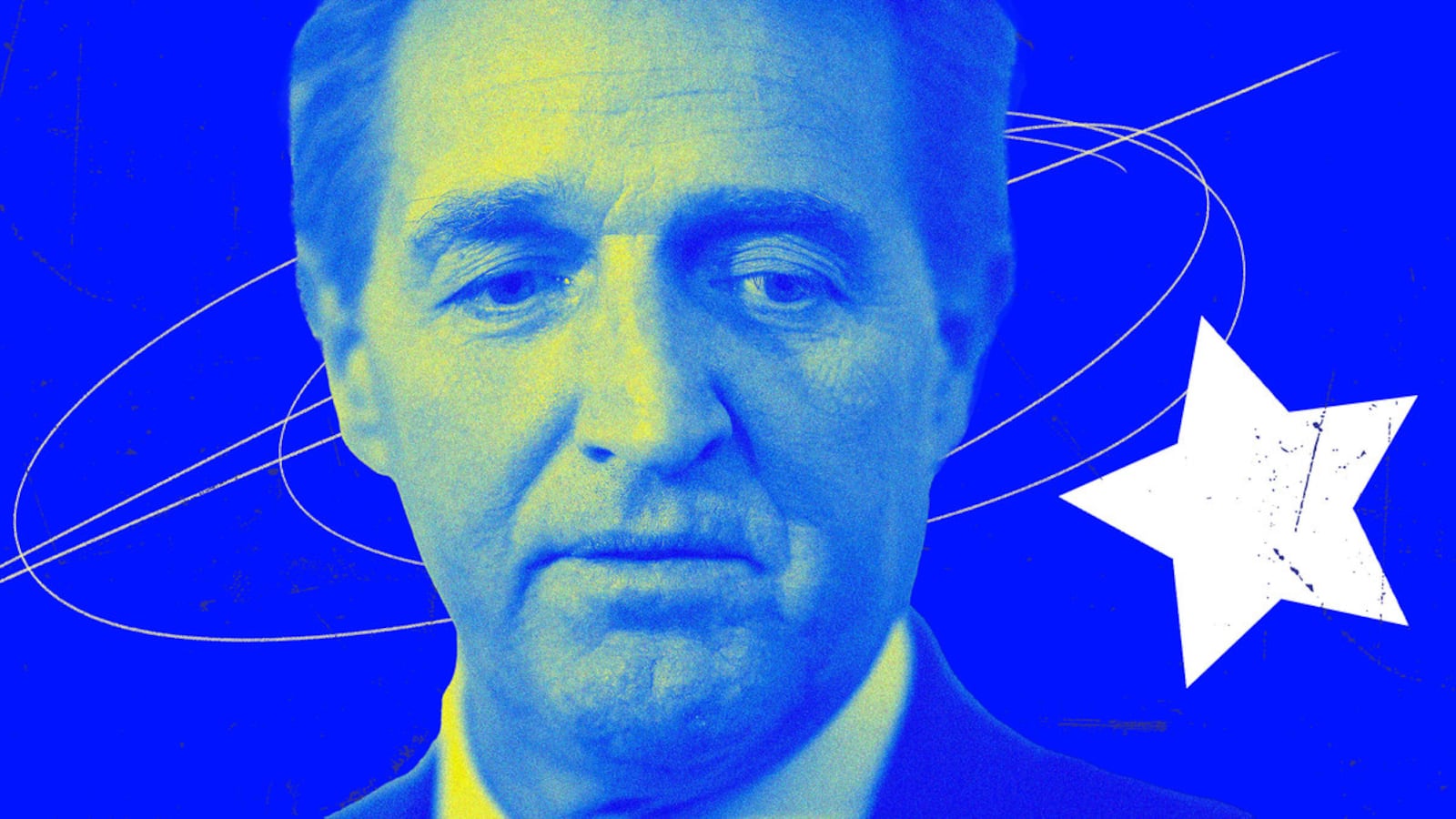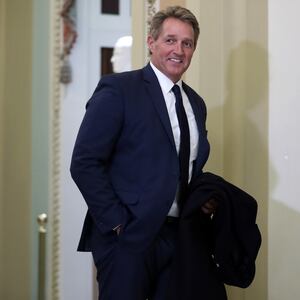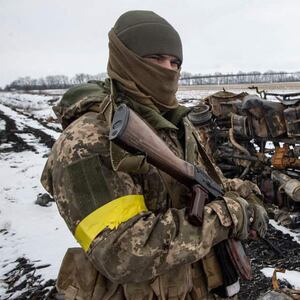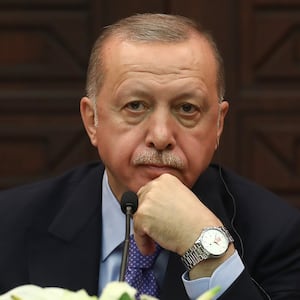In his last job, Jeff Flake went to work every day with the risk of provoking the wrath of the world’s most powerful person: then-President Donald Trump.
Three years after he retired as a Republican U.S. senator from Arizona rather than hold his tongue about the president, Flake has found himself a new job. And somehow, it might make his old one look like a breeze by comparison.
With the world on edge over Russia’s brutal invasion of Ukraine, Flake is stationed halfway across the world, serving as U.S. ambassador to a complicated ally with a unique ability to push for peace: Turkey.
When President Joe Biden nominated Flake to the post last year, the move was seen as a way for Biden to signal his commitment to bipartisanship—and, perhaps, a reward for Flake, who campaigned for Biden in 2020.
But in some corners, the ex-senator’s selection raised eyebrows. It had been 40 years since a non-career diplomat was selected for this high-profile and sensitive job. Flake not only had no special expertise in the politics of the region; he had never so much as set foot in Turkey.
In his September 2021 confirmation hearing, Flake’s former Senate colleagues warned he had his work cut out for him in the Turkish capital of Ankara. But that was months before Russian President Vladimir Putin decided to invade Ukraine, immediately making Flake’s already complicated job even more difficult.
Nearly every close observer of the Muslim-majority country of 84 million, split between Europe and Asia, agrees that Russia’s attempt to occupy and control Ukraine has put Turkey in a messy bind.
As one of 30 European and North American members of the North Atlantic Treaty Organization alliance, Turkey is inseparable from the West’s effort to stop the war. And if Russia were to attack any NATO member—a prospect that the Ukraine invasion has made gravely real—Turkey would be required to respond with force.
That decades-old obligation has kept Turkey close to the interests of the U.S. and Europe. But in recent years, the country’s increasingly autocratic leader, Recep Tayyip Erdogan, has warmed to Putin, despite their historic rivalry in the region.
The two countries now have extensive ties, including in defense. In 2017, Turkey purchased $2.5 billion worth of missile defense systems from Russia, a move that prompted alarm in Washington and tough U.S. sanctions on Turkey.
Now, some experts believe the West’s ability to stymie Russia’s bloody war could hinge on Turkey’s willingness to help.
“It is hard to imagine success for NATO in this crisis without at least diplomatic support from Turkey,” said James F. Jeffrey, who served as U.S. ambassador to Turkey in the Barack Obama administration.
The view on Turkey’s moves, so far, is mixed. Some argue Erdogan has taken a tougher-than-expected line toward Moscow, while others feel that his government is unhelpfully playing both sides.
Turkey will be at center stage no matter what. On Thursday, the Russian and Ukrainian foreign ministers met in the resort city of Antalya for their first face-to-face talks since the war began.
Later on Thursday, Biden and Erdogan spoke directly by phone. An official readout from the White House said that the two leaders “discussed their shared concern about Russia’s unprovoked and unjustified invasion of Ukraine.” Biden also “expressed appreciation for Turkey’s efforts to support a diplomatic resolution to the conflict.”
Flake now has a core responsibility in ensuring the Turkish cooperation that U.S. observers say is critical to turning the tide in Ukraine. And according to Jeffrey, he is hardly a figurehead in Ankara—the U.S ambassador is a central player in the protocol-focused Turkish government’s diplomatic operations, giving the diplomat unparalleled space to shape high-level discussions between the countries.
In a statement provided to The Daily Beast, Flake said “my Embassy team and I engage every day with the Turkish government, as well as the Ukrainian Embassy here, to discuss ways in which we can help Ukraine.”
The ambassador had plenty of praise for Turkey’s response to Russia’s invasion, saying that “Turkey has been steadfast in its support for Ukraine’s territorial integrity and sovereignty,” noting in particular the country’s welcoming of Ukrainian refugees.
But Flake also struck the careful note he did in his confirmation hearing, noting Turkey’s “democratic backsliding” and attacks on press freedom, while also referencing the alarm sparked by its acquisition of Russian-made defense systems.
“Members of Congress of both parties share these concerns, and I will keep these issues on the agenda with Turkey, as will Washington,” Flake said. “But we also have tremendous opportunities, to expand our trade and investment ties, to increase people-to-people exchanges, and to work together to resolve regional conflicts.”
To Flake’s admirers, he is more than capable of pulling off the delicate balancing act his job requires. Sen. Lindsey Graham (R-SC), who embraced Trump when Flake didn’t, told The Daily Beast that his former colleague is “uniquely situated” to navigate the “currents” presented by Turkey’s unique status as a “problematic but valuable NATO ally.”
“He’s the right guy in the right place at the right time,” Graham said.
It’s an unexpected turn for Flake—something he openly acknowledges. “I did not take a traditional path to becoming an ambassador, though I’ve always had a great respect for and interest in diplomacy,” he said in his statement.
The conservative Republican, who served five terms in the U.S. House and one in the Senate, did bring considerable international expertise to the job, just not in Turkey’s neighborhood.
A devout Mormon, Flake completed his missionary service in South Africa and Zimbabwe, and later lived in Namibia. He speaks Afrikaans, the Dutch-based language widely spoken in southern Africa. In the Senate, he chaired the Senate Foreign Relations Committee’s sub-panel focusing on Africa.
When Biden nominated Flake, Namik Tan, a former Turkish ambassador to Washington, plainly wrote in an op-ed that he “does not have enough experience regarding Turkey and the region.”
“On the other hand,” Tan added, “Flake’s limited experience about Turkey and its neighborhood could help him [make] moves without any prejudices regarding Turkey.”
Defne Arslan, senior director of the Turkey program at the Atlantic Council, a foreign policy think tank, noted that Biden’s appointment of a non-career diplomat came after Erdogan sent a close political ally to Washington.
Speaking from Turkey, she told The Daily Beast that Flake’s selection was “an interesting choice, but… a good choice, I think.”
“It told me that there is a big intention on the U.S. side to put things on track,” Arslan said. “As a political appointee, with a direct line to President Biden, and also with ties to Congress, I think there could be a big role that Ambassador Flake can play.”
In his class of ambassadors, Flake quickly impressed peers with his acumen, despite never having been to Turkey before his appointment. One diplomat specifically cited Flake’s experience as one of the lone Republicans to stand athwart Trump’s populist takeover of the Republican Party as a predicting factor in his future success as an ambassador to a country with its own strongman.
“Any Republican who was willing to stand up to Trump, basically alone, that’s a mark of personal fortitude,” the diplomat said.
Another diplomat pointed to Flake’s membership in the Church of Latter-Day Saints—a community that prides itself in honesty, integrity and service—as having been readily apparent during pre-confirmation training.
“He took it very seriously—he understood the stakes of the work, and the stakes of mistakes if he were to fall short,” they said.
Flake faced light questioning at his hearing, and he was confirmed in the Senate in October by voice vote, a sign of how uncontroversial his appointment was. Russia invaded Ukraine barely a month after Flake arrived in Ankara in January to present his credentials to Erdogan, confronting the newly minted ambassador with an immediate trial by fire.
Western experts consider Erdogan to be personally fond of Putin, despite their proxy standoffs in the region—most notably in Syria, where they have backed opposite sides in that country’s brutal civil war. In 2021, Erdogan publicly defended Putin after Biden called him a “killer,” saying the remark was “not fitting of a U.S. president.”
But Erdogan has nevertheless publicly condemned Putin’s invasion of Ukraine. And Erdogan’s spokesperson said that in a private call on Sunday, the Turkish president planned to tell Putin to put an end to the war.
Beyond that, Turkey invoked its power under a nearly century-old treaty to block Russian warships from traveling through its straits connecting the Black Sea and the Mediterranean Sea during times of “war,” limiting Putin’s ability to leverage the power of Russia’s naval forces in Ukraine. Turkey has enjoyed its own warm relations with Ukraine, and Kyiv’s military has already put Turkish-made drones to use in strikes against Russian targets.
Asked what success looks like for the West in bringing Turkey’s influence to bear on Russia, Jeffrey, the former U.S. ambassador, said it’s “what you’re seeing.”
“The Turks are seeing that Putin looks weak, and the West looks kick-ass,” he said. “Everyone wants to go with a winner.”
Others are less sure. Aykan Erdemir, a former Turkish member of parliament now with the Foundation for Defense of Democracies think tank, argued Turkey is trying to have it both ways—tailoring its Russia-critical moves to the West while emphasizing its disengagement to Moscow.
Turkey cannot afford to alienate Russia too much, Erdemir explained, because of how heavily the country’s ailing economy depends on Russia. Turkey imports more goods from Russia than from any other country, needs the money brought by Russian tourists, and relies on Russia for energy.
That all helps explain why Erdogan has broken with the U.S. and most other Western countries in refusing to impose sanctions on Russia after it launched the invasion. On top of that, Turkey is the only NATO country left that is open to Russian aircraft, and is now Russia’s most essential air travel link to the rest of the world.
The Biden administration and Flake are offering “generous praise” and “positive messaging toward Ankara,” Erdemir said, calling it “an attempt to encourage Ankara to take the Ukraine war as an opportunity to recalibrate its foreign policy.”
“It sounds like an exciting plan, but it’s easier said than done,” Erdemir said.
In his statement, Flake made clear he is not giving up on bringing Turkey along, saying, “We need to play the long game.” And he indicated he hoped his former colleagues, some of whom are harshly critical of Ankara, might do the same.
It will not be an easy task. That is perhaps fitting for the person who attempted a lonely, doomed campaign to weaken Trump’s hold on the GOP.
“When the Biden Administration approached me about becoming an Ambassador, I said I would be honored, but I wanted to serve somewhere consequential,” Flake said. “Turkey is surely consequential.”
—with reporting from Scott Bixby










